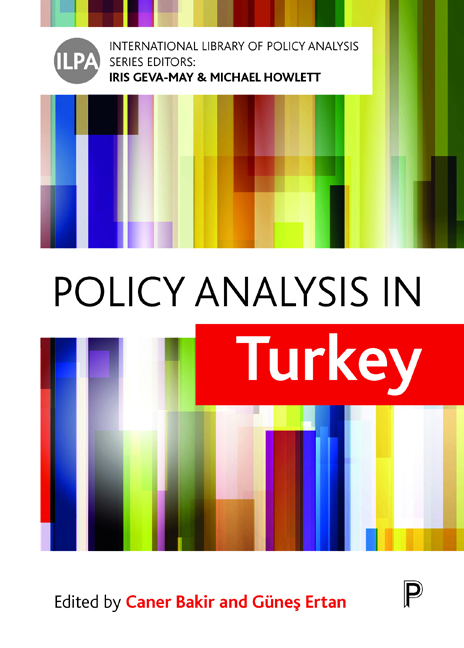Book contents
- Frontmatter
- Contents
- List of tables and figures
- Notes on contributors
- Editors’ introduction to the series
- one Pushing the pendulum from politics to policy: the state of policy analysis in Turkey
- Part One Historical roots, styles and methods of policy analysis in Turkey
- Part Two Policy analysis by governments
- Part Three Experts, international actors and public opinion
- Part Four Parties and civil society-based policy analysis
- Part Five Academic, bureaucratic and advocacy-based policy analysis
- Index
fourteen - Think tanks and policy analysis in Turkey
Published online by Cambridge University Press: 19 April 2022
- Frontmatter
- Contents
- List of tables and figures
- Notes on contributors
- Editors’ introduction to the series
- one Pushing the pendulum from politics to policy: the state of policy analysis in Turkey
- Part One Historical roots, styles and methods of policy analysis in Turkey
- Part Two Policy analysis by governments
- Part Three Experts, international actors and public opinion
- Part Four Parties and civil society-based policy analysis
- Part Five Academic, bureaucratic and advocacy-based policy analysis
- Index
Summary
Introduction
Think tanks are informal actors that play pivotal roles in public policy-making processes. They are mostly non-governmental organisations (NGOs) that have the capacity to set their own research agendas and produce policy-relevant knowledge. The increased complexity and changing nature of societal problems governments encounter and the need for more analytical capacity to deal with such problems has increased their importance in policy processes.
The origins of think tanks can be traced back to the early 20th century, when governments in the US and UK were forced to respond to problems created by urbanisation, industrialisation and economic growth (Stone and Garnett, 1998). After the first wave of think tanks created in the first decades of the century, another wave came in the US, after the Second World War. Beginning with the 1980s, think tanks proliferated, not only in the countries they originated in, but also around the world.
Turkey is among those countries where think tanks have proliferated and participated in policy-making processes in recent decades. In this chapter, we trace the history of think tanks in Turkey, and present the results of the findings of our content analyses of policy papers produced by the most prominent think tanks in the 2000s. In these analyses we investigated two sets of issues. First, we categorised and tracked the policy areas and topics covered in the papers produced by think tanks (international relations, education, etc). The topics they covered and emphasised have parallels with the prevalent policy issues of their time. Second, we assessed to what extent the authors of the reports followed academic and analytical conventions that are used in the policy analysis and evaluation literature, and applied policy-analytical methods. Although no universal norms or formats exist for policy analysis papers, there are some conventions and methods that are commonly covered in the main textbooks of policy analysis and evaluation (see, for example, Dunn, 2012; Rossi et al, 2004) and promoted by professional organisations (see, for example, the Society for Benefit-Cost Analysis, https://benefitcostanalysis.org/ and the Campbell Collaboration, www. campbellcollaboration.org/). The extent to which these conventions and methods are covered in the papers provides an indication of the level of development not only of the think tanks in Turkey, but also that of the policy analysis practice in the country.
- Type
- Chapter
- Information
- Policy Analysis in Turkey , pp. 235 - 254Publisher: Bristol University PressPrint publication year: 2018



